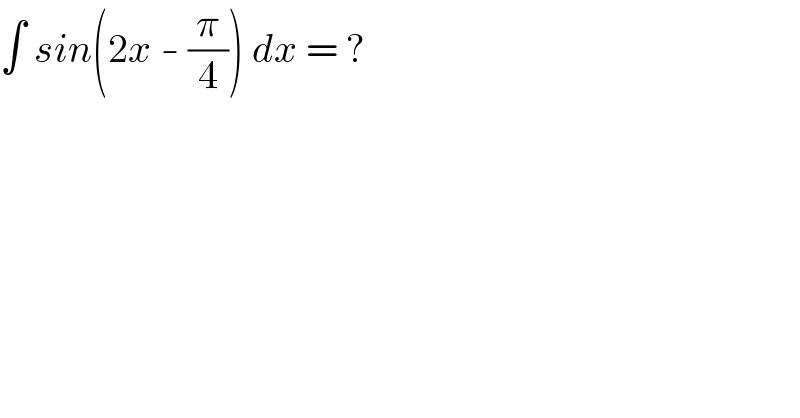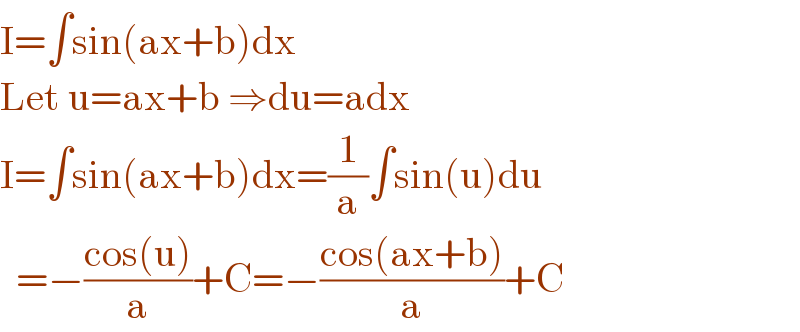
Question Number 146285 by mathdanisur last updated on 12/Jul/21

$$\int\:{sin}\left(\mathrm{2}{x}\:-\:\frac{\pi}{\mathrm{4}}\right)\:{dx}\:=\:? \\ $$
Commented by gsk2684 last updated on 12/Jul/21

$${what}\:{are}\:{you}\:{studying}\:{now}? \\ $$
Commented by mathdanisur last updated on 12/Jul/21

$${these} \\ $$
Answered by gsk2684 last updated on 12/Jul/21

$${use}\:{the}\:{formula}\: \\ $$$$\int\mathrm{sin}\:\left({ax}+{b}\right)\:{dx}=−\frac{\mathrm{cos}\:\left({ax}+{b}\right)}{{a}} \\ $$
Commented by Ar Brandon last updated on 12/Jul/21

$$\mathrm{I}=\int\mathrm{sin}\left(\mathrm{ax}+\mathrm{b}\right)\mathrm{dx} \\ $$$$\mathrm{Let}\:\mathrm{u}=\mathrm{ax}+\mathrm{b}\:\Rightarrow\mathrm{du}=\mathrm{adx} \\ $$$$\mathrm{I}=\int\mathrm{sin}\left(\mathrm{ax}+\mathrm{b}\right)\mathrm{dx}=\frac{\mathrm{1}}{\mathrm{a}}\int\mathrm{sin}\left(\mathrm{u}\right)\mathrm{du} \\ $$$$\:\:=−\frac{\mathrm{cos}\left(\mathrm{u}\right)}{\mathrm{a}}+\mathrm{C}=−\frac{\mathrm{cos}\left(\mathrm{ax}+\mathrm{b}\right)}{\mathrm{a}}+\mathrm{C} \\ $$
Commented by mathdanisur last updated on 13/Jul/21

$${thanks}\:{Ser} \\ $$
Answered by puissant last updated on 12/Jul/21
![=∫sin(2x)cos(π/4)−cos(2x)sin(π/4) dx =((√2)/2)∫(sin(2x)−cos(2x)) dx =((√2)/2)[−(1/2)cos(2x)−(1/2)sin(2x)]+c I=−((√2)/4)(cos(2x)+sin(2x))+c..](Q146302.png)
$$=\int\mathrm{sin}\left(\mathrm{2x}\right)\mathrm{cos}\frac{\pi}{\mathrm{4}}−\mathrm{cos}\left(\mathrm{2x}\right)\mathrm{sin}\frac{\pi}{\mathrm{4}}\:\mathrm{dx} \\ $$$$=\frac{\sqrt{\mathrm{2}}}{\mathrm{2}}\int\left(\mathrm{sin}\left(\mathrm{2x}\right)−\mathrm{cos}\left(\mathrm{2x}\right)\right)\:\mathrm{dx} \\ $$$$=\frac{\sqrt{\mathrm{2}}}{\mathrm{2}}\left[−\frac{\mathrm{1}}{\mathrm{2}}\mathrm{cos}\left(\mathrm{2x}\right)−\frac{\mathrm{1}}{\mathrm{2}}\mathrm{sin}\left(\mathrm{2x}\right)\right]+\mathrm{c} \\ $$$$\mathrm{I}=−\frac{\sqrt{\mathrm{2}}}{\mathrm{4}}\left(\mathrm{cos}\left(\mathrm{2x}\right)+\mathrm{sin}\left(\mathrm{2x}\right)\right)+\mathrm{c}.. \\ $$
Commented by mathdanisur last updated on 12/Jul/21

$${Thank}\:{you}\:{Ser} \\ $$
Answered by Ar Brandon last updated on 12/Jul/21

$$\mathrm{I}=\int\mathrm{sin}\left(\mathrm{2x}+\frac{\pi}{\mathrm{4}}\right)\mathrm{dx} \\ $$$$\:\:=−\frac{\mathrm{1}}{\mathrm{2}}\mathrm{cos}\left(\mathrm{2x}+\frac{\pi}{\mathrm{4}}\right)+\mathrm{C} \\ $$
Commented by mathdanisur last updated on 13/Jul/21

$${thanks}\:{Ser} \\ $$
